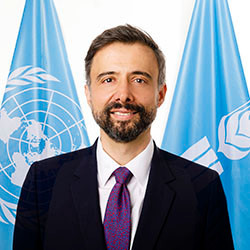Sixth Global Meeting of the Indigenous Peoples’ Forum
IFAD Asset Request Portlet
Asset Publisher
Sixth Global Meeting of the Indigenous Peoples’ Forum
Welcoming remarks by Alvaro Lario, President of IFAD
By Alvaro Lario
Location: Rome, Italy
09 February 2023Check against delivery
Welcome to this Sixth Global Meeting of the Indigenous Peoples’ Forum at IFAD.
It is a pleasure to be able to meet in person.
You have chosen a topic for this Forum that is not only universal, but also the defining challenge of our era. It is no exaggeration to say that climate change is an existential crisis for most of life on earth.
As we search for effective responses, I think three things are clear.
First, the only way to turn the tide on climate change is for governments and institutions like IFAD to join forces with Indigenous Peoples.
Indigenous Peoples are recognised as the stewards of nature and biodiversity. But the reality is even more pronounced.
Indigenous Peoples know the land and the seas, the Earth’s plant life and animal life with an intimacy that no agronomist, project designer or funding provider ever will.
IFAD works in all the settings where Indigenous Peoples live – the mountains and hills; the valleys and plains; the islands and shoreline.
The knowledge of Indigenous Peoples is invaluable. It can guide us in transforming food systems and responding to climate change. We also recognise the need to advocate for social justice and land rights for Indigenous Peoples’ communities.
This leads to my second point. Local experience and international expertise complement each other. Effective and sustainable development depend on both.
IFAD has been working with Indigenous Peoples for more than 40 years. We didn’t always get it right. But we have learned – along the way – that it is wise to listen to your knowledge and experience. And that our projects and programmes work best when they are tailored to the identities, values and cultures of Indigenous Peoples.
For example, With the support of the Swedish International Development Cooperation Agency (Sida) in Ethiopia, Kenya and Mexico we are successfully engaging Indigenous consultants in our project design missions. This is a way of putting Free, prior and informed consent into practice. We will hear more of this experience later today.
Our Indigenous Peoples Assistance Facility (IPAF) has helped Indigenous Peoples’ organizations strengthen their communities the world over. And it has helped IFAD on our learning process.
My final point is that economic and social development must be community-driven and community-led. Rural people know the strengths and weaknesses of their own communities better than anyone, and what they need to improve their lives and livelihoods, much better than we do.
It is therefore for YOU to decide your development priorities and strategies. The role of IFAD is to support you in developing and implementing your aims.
Dear partners and friends,
In IFAD’s 12th funding period, which is now drawing to a close, we promised to ensure that Indigenous Peoples would be prioritized in at least ten projects. We also pledged to review our Policy on Engagement with Indigenous Peoples, and we have.
Our policy now states very clearly that IFAD works with Indigenous Peoples as equal partners to co-create strategies and design and monitor investments.
Looking ahead, as IFAD continues its work with Indigenous Peoples and their organizations, our priorities will include improving nutrition, and safeguarding biodiversity through traditional food systems.
We will also continue to focus on the needs and roles of women and youth, especially in passing on knowledge and culture from one generation to the next.
Climate change is a collective challenge. The best solutions will be as varied as the terrain which shapes the world’s many Indigenous Peoples’ communities.
IFAD understands that Indigenous Peoples are often struggling to survive, and do not always reap the full benefits of develop programmes.
We will keep working with you and your organizations so that Indigenous Peoples can achieve their own development goals. And so that the knowledge and wisdom of Indigenous Peoples informs all of our work on the ground.
I wish you every success in finding the best ways forward. And I assure you of IFAD’s continued commitment and partnership on the road ahead.
Thank you.
